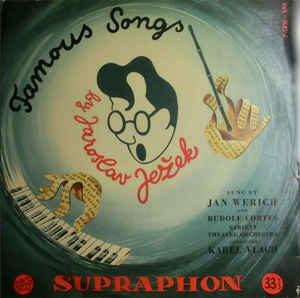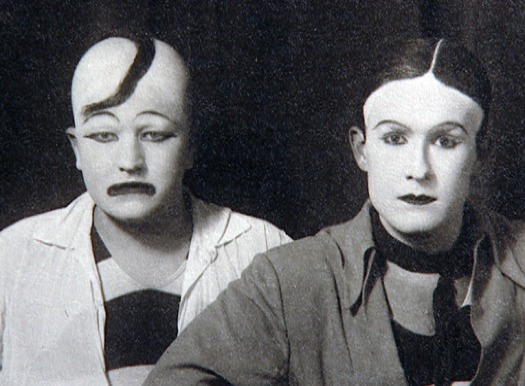Phantom Dancer :: 12:00pm 27th Nov 2018

1930s-40s PRAGUE SWING
Prague, the Czech capital, was one of the swing hubs of Europe up until the Communists came in 1948. And since we had Texan Western Swing sung in Czech on last week’s Phantom Dancer, this week’s Phantom Dancer with Greg Poppleton features a small set of Czech swing from the Ultraphon label 1931-45.
PHANTOM DANCER
The Phantom Dancer is your non-stop swing and jazz mix of live 1920s-60s radio and TV every week. I’ve been bringing you The Phantom Dancer on radio 2SER, and now online, since 1985.
Hear this week’s Phantom Dancer (after Nov 20) and past Phantom Dancers at 2ser.com.
Hear the show live every Tuesday 12:04-2pm on 107.3 2SER Sydney
ALLANOVY SESTRY

The Allan Sisters, Jiřina Salačová , Věra Kočvarová and Radka Hlavsová, began singing original songs in the style of the Boswell and Andrews Sisters in 1940. They were discovered by Prague bandleader Karel Vlach. They also performed with leading Prague band leader R Dvorský. They expanded to a quartet 1946-48 with Vera Holotíková. She was the last living Allanoy (1924-2918).
JAROLSLAV JEZEK
Ježek was a pianist, band leader, and composer of swing, classical and film music who was significantly blind from childhood.
He was forced to migrate to the U.S after the Nazi occupation and died in New York City in 1942.
His Wiki entry states,
Ježek’s “musical output is commonly divided into two parts.
The first part – chamber, piano and concertant compositions – created first under the influence of Stravinsky, of the Parisian Les Six and of Arnold Schönberg.
The second part – a popular jazz composer in pre-war Czechoslovakia.
He composed songs and dances for Prague Free Theatre revues (The Ass and the Shadow, Caesar, The Headsman and the Fool) and also for the films of Voskovec and Werich (Powder and Petrol, The World Is Ours, Heave Ho!).
His innovative melodies are still well known in the Czech Republic.
Ježek was also influenced by American jazz.
Between 1929 and 1936 he organized and conducted an orchestra featuring his original jazz compositions and arrangements. Billed variously as ‘Ježek’s Jazz'” and ‘Ježkův swingband’ they recorded for the Czech Ultraphon label, making some of the most original music in Europe.
A few of these recordings are, ‘Bugatti Step’ (1930), an up-tempo number for piano and jazz orchestra that enjoys enduring popularity as a hot jazz piano solo; ‘Teď ještě ne’ (Not Yet) (1931), a rousing dance music in the Jean Goldkette style; and ‘Rubbish Heap Blues’ (1937) inspired by Duke Ellington.
OSVOBOZENE DIVADLO
Liberated Theatre, Osvobozené Divadlo was an important part of the cultural life of the Czechoslovakian First Republic.. Jarolslav Ježek wrote music for the troupe and conducted the orchestra.
Originally inspired by Dadaism and Futurism with improvised performances reacting to the audience on plays by G. Apollinaire, A. Jarry, J. Cocteau, A. Breton, F. T. Marinetti and V. Nezvalthe, the theatre group distilled to a foursome by 1930 – Voskovec, Werich, Ježek, and Honzl.
Osvobozené Divadlo introduced ‘forbíny’, from the German, ‘Vorbühne’ or forestage – improvised dialogues front of stage usually presenting topical reactions to political and cultural events and subjects.
In 1932 Voskovec and Werich presented the first overtly political play, Caesar, warning against the danger of Nazism. From then on, the theatre began to be regarded as political. Another strongly anti-fascist play, Osel a stín (The Ass and the Shadow; 1933), was also very leftist-oriented. In 1934 Osvobozené divadlo presented another play, Kat a blázen, whose criticised Nazism. The play had problems with censorship and the German embassy lodged strong protests with management. After continuing complaints from German officials Osvobozené divadlo was expelled from its original theatre building.
Later anti-Nazi plays – Svět za mřížemi, Pěst na oko as well as Kat a blázen, caused demonstrations by fascists in the audience and led to a prohibition of all activities. The theatre was officially closed on November 10 1938 and in January 1939 Voskovec, Werich and Ježek emigrated to the United States.
After World War II. Werich and Voskovec (Ježek died in 1942 in New York City) came back from exile and attempted to restore Osvobozené divadlo, but the social atmosphere in post-war Czechoslovakia was different and not very friendly to their kind of satire. After the communist putsch in 1948, Voskovec emigrated again and the activity of the theatre stopped completely.
VIDEO
This week’s Phantom Dancer video of the week is the Ježek, Voskovec, Werich song – Život je jen náhoda with JarolslavJežek’s Orchestra and the Bajo-trio singing. They are Anita Schlesingerová and Jožka Srbová.
27 NOVEMBER PLAY LIST
|
Play List – The Phantom Dancer
107.3 2SER-FM Sydney, Live Stream, Digital Radio
Community Radio Network Show CRN #342 |
||
|
107.3 2SER Tuesday 27 November 2018 |
||
|
Set 1
|
Hot 1930s Radio | |
|
Open + Let’s Dance
|
Ray Anthony Orchestra
|
‘One Night Stand’
Cafe Rouge Statler Hotel NYC AFRS Re-broadcast 12 Dec 1950 |
|
Open + Song of the Wanderer
|
Buddy Morrow Orchestra
|
‘One Night Stand’
Blue Room Hotel Lincoln NYC AFRS Re-broadcast 27 May 1946 |
|
Elk’s Parade + Close
|
Bobby Sherwood Orchestra
|
‘One Night Stand’
Avadon Ballroom Southgate Ca AFRS Re-broadcast 3 Jun 1946 |
|
Set 2
|
Chamber Music Society of Lower Basin Street | |
|
Open + Dark Eyes
|
Henry Levine Octet
|
‘Chamber Music Society of Lower Basin Street’
WJZ NBC Blue NY 23 Jun 1941 |
|
Rocking Chair
|
Diane Courtney
|
‘Chamber Music Society of Lower Basin Street’
WJZ NBC Blue NY 23 Jun 1941 |
|
Peter and the Wolf
|
Paul Lavalle’s Woodwinds
|
‘Chamber Music Society of Lower Basin Street’
WJZ NBC Blue NY 23 Jun 1941 |
|
Set 3
|
Coltrane Radio | |
|
Open + Favourite Things
|
John Coltrane Quartet
|
The Half Note
WABC-FM MY 7 May 1965 |
|
Set 4
|
1930s-40s Prague Jazz | |
|
Swing Cocktail
|
Jaroslav Ježek Orchestra
|
Ultraphon
Prague 1936 |
|
Land Full of Singing
|
Allanovy Sestry
|
Ultraphon
Prague 1945 |
|
Chybami se clovek uci
|
Osvobozené Divadlo
|
Ultraphon
Prague 1932 |
|
Set 5
|
Big Bands on 1941 Radio | |
|
Combination Solid
|
Charlie Spivak Orchestra
|
Radio Transcription
New York 1941 |
|
Open + Swing Low Sweet Chariot
|
Tommy Dorsey Orchestra
|
‘Camel Caravan’
WABC CBS NY 3 Jan 1939 |
|
Open + Amour
|
Gene Krupa Orchestra (voc) Anita O’Day
|
Palladium Ballroom
KNX CBS LA 1 Oct 1941 |
|
Nobody Ever Wants Me
|
Glenn Miller Orchestra (voc) Trigger Alpert
|
‘Chesterfield Show’
WABC CBS NY 24 Dec 1941 |
|
Set 6
|
Helen Forrest Sings With Artie Shaw | |
|
A Table in a Corner
|
Helen Forrest (voc) Artie Shaw Orchestra
|
Cafe Rouge
Hotel Pennsylvania WEAF NBC Red New York City 20 Oct 1939 |
|
Comes Love
|
Helen Forrest (voc) Artie Shaw Orchestra
|
Summer Terrace
Ritz-Carlton Hotel WNAC NBC Red Boston 18 Aug 1939 |
|
Melancholy Lullaby
|
Helen Forrest (voc) Artie Shaw Orchestra
|
Cafe Rouge
Hotel Pennsylvania WEAF NBC Red New York City 21 Oct 1939 |
|
Day In, Day Out
|
Helen Forrest (voc) Artie Shaw Orchestra
|
Cafe Rouge
Hotel Pennsylvania WEAF NBC Red New York City 19 Oct 1939 |
|
Set 7
|
Selling Shoes on 1932 Radio | |
|
I’ve Got Five Dollars (theme) + Somebody Stole My Gal
|
Freddy Rich Orchestra
|
‘Friendly Five Footnotes’
Radio Transcription New York City 1931 |
|
Hiding in the Shadows of the Moon
|
Freddy Rich Orchestra
|
‘Friendly Five Footnotes’
Radio Transcription New York City 1931 |
|
Zonky
|
Freddy Rich Orchestra
|
‘Friendly Five Footnotes’
Radio Transcription New York City 1931 |
|
Waiting for the Robert E Lee
|
Freddy Rich Orchestra
|
‘Friendly Five Footnotes’
Radio Transcription New York City 1931 |
|
Set 8
|
Harmony Singers on the Air | |
|
Stardust
|
The King Sisters
|
Radio Transcription
Los Angeles 1947 |
|
No Wonder
|
The Inkspots
|
WFIL NBC Red
Philadelphia 12 Jul 1939 |
|
The Honeydripper
|
Jimmie Lunceford Quartet
|
‘Spotlight Bands’
Jefferson Barracks, Missouri Mutual Network 23 Nov 1945 |
|
Deedle + All The Things You Are
|
Dave Lambert and Buddy Stewart
|
‘Symphony Sid Show’
Royal Roost WMCA NYC 5 Mar 1949 |











